On the occasion of the best electoral result in the history of the Green Party of Canada, it’s important to take a few minutes to examine where the party has been and where it goes from here. It’s also critical, I believe, to acknowledge there were some real weaknesses in last night’s results and in the national campaign as well. This discussion is just beginning; here’s my opening contribution.
Early history
The beginnings of the Green Party of Canada were inauspicious to say the least. Very little about its founding convention in 1983 at Carleton University is publicly documented. Instead, we have an oral history that describes a mishmash of variously interested activists who couldn’t even agree on what kind of organization they were creating. A member who attended that first meeting, Dan Murray, describes “some guy…walking around handing out mimeographed sheets” saying he should be elected leader. Murray says “the dude was shunned and laughed at. I remember asking him why we would want one of those when every other party already has one?”
After officially registering on August 8, 1984, the federal party (much weaker than its provincial counterparts in British Columbia and Ontario) didn’t hold another federal conference or have a constitution until 1988, and until 1996 officially prohibited the leader of the party from acting as the party’s spokesperson.
Joan Russow, elected leader the following year, made some gains for the party in terms of media attention and electoral success, and, during the 2000 election, embarked on the party’s first national leader’s tour. Yet it wasn’t until the 2004 election under Jim Harris (who had lost the leadership to Russow in 1997) that the party made its great leap forward.
Breakthrough
Harris (now somewhat famously) recognized a huge opportunity in the newly implemented $1.75 per vote funding for any party that broke 2% in a federal election. In 2000 the Greens had garnered 0.81% of the vote with only 111 candidates, so Harris figured that even if all they did was run a candidate in all 308 ridings they’d pass the threshold.
He was right, and with 582,247 votes (4.3%) in the 2004 election the Green Party of Canada became a million dollar political organization overnight. This was both an exciting breakthrough, and the result of a “fake it ’til you make it” trick. I joined the party shortly after the 2004 election to discover it only had approximately 800 members. In order to pull-off the full slate, a third of the party’s membership had stood as candidates, sometimes in ridings on the other side of the country from where they actually lived.
Later that year at a general meeting and leadership convention in Bragg Creek, Alberta, there were signs the party wasn’t ready for this sudden success. Members (myself included) spent the first full morning simply arguing over the agenda. When someone proposed it should include a singing of the national anthem they were blocked by a member (who was also, not surprisingly, a former and future candidate) who explained that they “don’t believe in nations.” By the end of the weekend and after substantial amounts of rye whiskey consumption (I leave it up to you to decide if that fact is pertinent) the meeting had improved enough, and I had met enough good people, to become tentatively reassured I was in the right place.
Still, major internal growing pains were never allowed an opportunity to settle down or heal. Minority governments necessitated perpetual election readiness, straining the reborn party’s finances and volunteers, and taking the focus away from important—and, in some cases, still unresolved—questions about internal procedures, governance, and purpose.
Elizabeth
The 2006 policy and leadership convention in Ottawa that elected Elizabeth May leader was another huge step for the party. Thanks largely to her pre-established national profile and the influx of new members her leadership campaign generated, for the first time not only did CPAC broadcast the whole convention, but as the leadership results were announced Don Newman himself reported live for CBC Newsworld from the floor of the convention centre. Pundits credited May’s strong showing in the London North Centre by-election later that year, as well as strong results in four simultaneous 2008 by-elections (including my own), with helping to secure further credibility with the national media and, in another first for the party, an invitation to the 2008 election leaders’ debates.
Disappointment
That highpoint was followed by a pronounced denouement. While the party did slightly increase its share of the popular vote in 2008, after much hype it failed to come close to electing a single MP. In addition, comments May made about strategic voting had demoralized and angered a number of candidates and key volunteers who felt like their leader had advised people not to vote Green. As the election night “victory party” wound down at the Supermarket in Toronto, some key party members put on a brave face, but privately had a hard time seeing a way forward.
Following that disappointing result, the party’s Federal Council and Federal Campaign Committee (of which I have intermittently been a member) established several key objectives for the next campaign, but there was an understanding that the number one objective, to elect Elizabeth May, was the only one that really mattered. It was a strategy that explicitly placed all of the party’s eggs in one basket, and which former staffer Mark Kersten described as a Hail Mary pass. As the polls closed on May 2 2011, there was little doubt that the Green Party was heading for either its best federal result ever and a real breakthrough, or a politically devastating result that would threaten its future existence.
Last night
The best result yet
The list of people who believed last night’s result to be impossible is too long (and includes too many people within the party itself). But Greens are in the business of accomplishing the impossible, and last night the voters of Saanich—Gulf Islands made history. There are thousands of people who worked hard for years to make this happen, both directly and indirectly, but there isn’t a single member of the Green Party of Canada who could have brought it home other than Elizabeth May.
Nor is there a single measure of success that’s as important or as significant as establishing a beachhead in the House of Commons. Before, May wasn’t even allowed to answer media questions in the Centre Block foyer. Leaders’ salary and core office staff, paid for through public funds if you’re in the House, had to be carried completely by the political operation.
On actual issues, on votes and debates in the House of Commons, one voice will make a difference. Even in the minority Parliaments of the last few years, a strange unanimity has often dominated what should have been controversial debates. In 2007 for example, not a single MP opposed restarting the Chalk River nuclear reactor even though the regulator said it was missing a “key upgrade” that is “key to nuclear safety” and is required to make sure that “the core doesn’t melt down.” Similarly, not a single party in the 40th Parliament opposed the federal subsidy of the commercial seal hunt, even though many Canadians—and, increasingly, foreign governments and trading blocks—do. Further, critical issues like the climate crisis frequently get shoved out of the way by short-term political concerns. Regardless of where you stand on these issues, many Canadians who were previously unrepresented now finally have a voice.
As witnessed by the many Conservatives, Liberals, New Democrats and independents publicly celebrating the results in Saanich-Gulf Islands last night, Elizabeth May’s election isn’t just a victory for Greens, but for all Canadians who value a diversity of voices and want to see an elevation in our nation’s level of political discourse.
The worst result in a long time
And yet, while electing an MP was the only thing the Green Party needed to do last night to credibly claim victory, there’s also some bad news in the results and threats in the future. At less than 4% nationally, the party’s popular vote is the worst result since 2000, falling even lower than in 2004 when many candidates had principled objections to things like ordering lawn signs, asking for votes, combing their hair, etc. The cost of focusing resources on one riding was worth it, but there was a cost.
For example, local campaigns that receive at least 10% of the vote get 60% of their expenses reimbursed. In other words, a campaign that spends $80,000 is guaranteed to start the next election with at least $48,000. That’s a huge advantage in terms of riding strength and stability, and many Green riding associations (EDAs) were just starting to tap into that opportunity and build a fiscal foundation to carry them from election to election. Almost all of that evaporated last night, even in ridings that ran their strongest local campaigns ever only to see their vote reduced by more than half.
Serious challenges
The financial sustainability of the national party is also not guaranteed. The per-vote subsidy that gave birth to the modern Green Party of Canada is almost certainly doomed. For the first time since it gained national prominence, the party has to figure out how to fundraise on its own.
One of the biggest stories today is the soul searching and rebuilding the Liberal Party will have to do in the next few years. In the long run that could be positive, but Liberals are only in this position because they were forced. The Green Party isn’t so lucky: it needs to force itself to ask some hard questions and evaluate its own performance.
In addition to fundraising, the biggest challenges (and the biggest disappointments of the campaign) are in organizing and communications. For the second election in a row, the party failed to field a candidate in every riding despite promising to do so. (I don’t buy for a second the excuse that that’s due to a more vigorous vetting process. Frankly, if you’re not even finding rape jokes in the “favourite quotes” section of a candidate’s Facebook profile, I’m not sure I buy you’re vetting them at all.)
With regard to communications, ironically the party can be thankful its Director of Communications started this campaign with zero Twitter followers. I don’t think any of his counterparts would have gotten away with saying intervention in Libya was “sexy.” (See Lisa Raitt.) And I’m sorry, but when the person writing the alerts you’re pushing to iPhone users can’t compose a proper sentence, then rightly or wrongly, I lose confidence in your ability to govern. It’s not good enough to blame the media. The party needs to take responsibility for its own failure to communicate its message.
What’s next
This isn’t the first time I’ve openly mused about the Green Party’s future, and despite what I’ve said above, I’m more optimistic than ever. Still, these weaknesses give Greens reason to be thankful for a majority government, if only from a political strategy perspective. This is the first time in the history of the modern Green Party that we know when the next election is going to be. It’s the first time since 2004 that we can stand down from “election readiness mode” and take a step back. We have four years to build a fundraising base, reinvigorate and motivate grassroots volunteers, professionalize (though I know we don’t like that word) organizing and communications and plan to make sure that this wasn’t a one-off. We need great candidates in winnable ridings, and we probably need most of them to start campaigning within the next two years. We need to build our (virtual) bench strength so that when Elizabeth May is done being leader there’s someone who can take her place. (That day will come sooner than it feels right now, and right now, there’s no one.)
Today is for celebrating a hard fought, well earned, impossible victory. The party has come a long way since Carleton University in Ottawa, since Bragg Creek, Alberta, even since London North Centre. Tomorrow, as President Bartlet was fond of saying, we need to quickly move to “what’s next.”
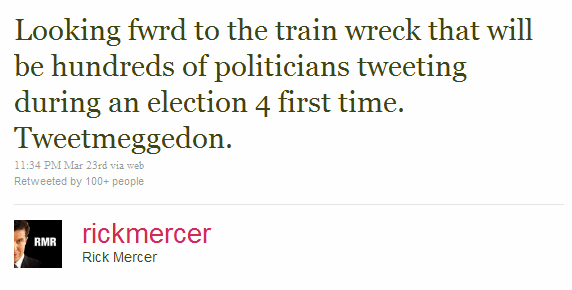
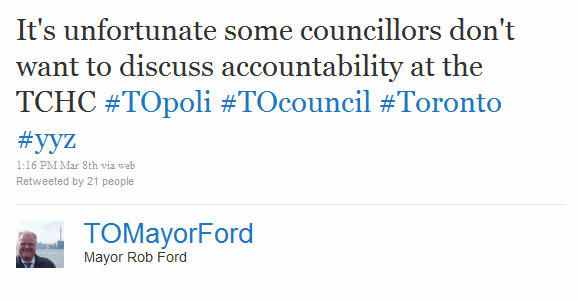
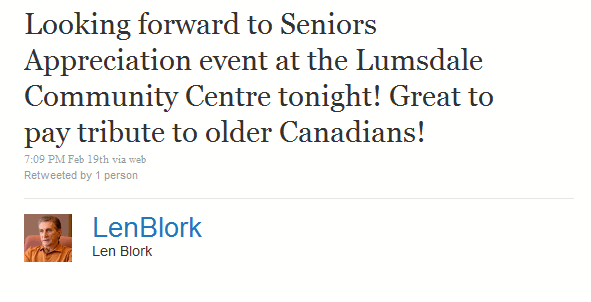
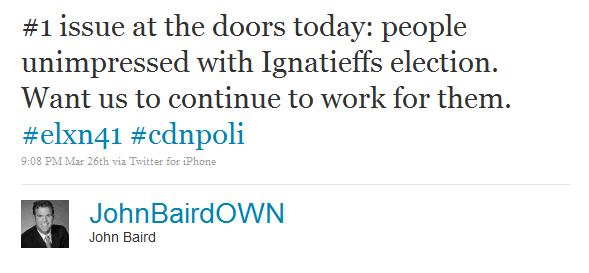
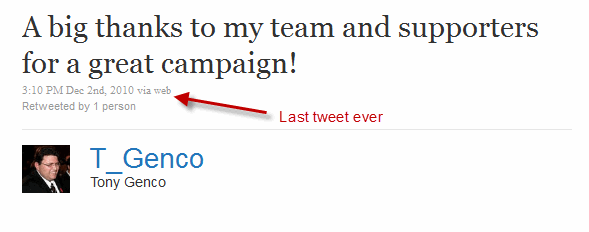
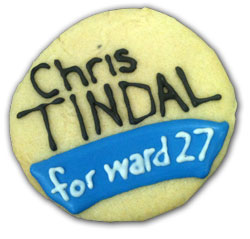 The results are in
The results are in Third, the strength of the other candidates. What an amazing thing we accomplished here. Over and over again people told me that there were multiple council candidates they wanted to vote for, who they thought would make great contributions to council. How often does that happen? When was the last time you voted in an election and thought, “gosh, there are just too many good choices?” It’s remarkable.
Third, the strength of the other candidates. What an amazing thing we accomplished here. Over and over again people told me that there were multiple council candidates they wanted to vote for, who they thought would make great contributions to council. How often does that happen? When was the last time you voted in an election and thought, “gosh, there are just too many good choices?” It’s remarkable.